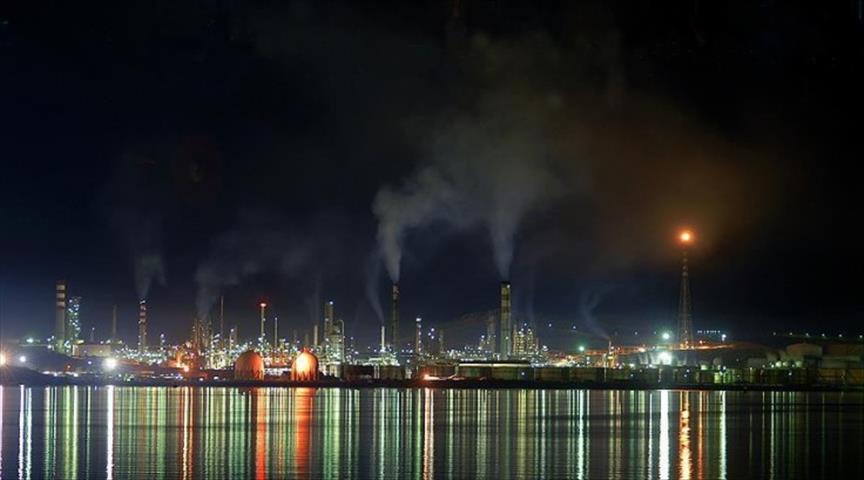Turkey is considering the introduction of carbon pricing and is already putting in place a mandatory system for measuring and reporting greenhouse gas emissions for large installations, Jan-Willem van de Ven, Associate Director, Head of Carbon Markets at the European Bank for Reconstruction and Development (EBRD) told Anadolu Agency.
In an exclusive interview, van de Ven said the voluntary carbon market, particularly in Turkey, emerged in the absence of a regulated carbon market, which developed in other countries, including the Emissions Trading Scheme in the EU, China, South Korea and in several U.S. states.
'The voluntary carbon market demand mainly comes from outside Turkey, for example from corporates that voluntarily (e.g. for marketing purposes) buy carbon credits to offset the climate impact of their greenhouse gas emissions. We anticipate that Turkey will remain mainly a voluntary carbon market until 2020,' he said, adding that thereafter international drivers are likely to change, driven by the Paris Agreement coming into operation.
'In addition, a new global mandatory carbon market is emerging for the aviation industry, called CORSIA, which will impact airlines operating from Turkey. This may introduce a shift from international demand to Turkish demand for domestically produced carbon credits,' he added.
The EBRD is considering the emergence of a Turkish pre-compliance carbon market, van de Ven said, explaining that in order for Turkey to remain competitive and productive, with the ability to tackle its negative energy balance, it would be beneficial to put a price on carbon.
Since 2010, the EBRD has been supporting project developers in structuring carbon projects and in promoting demand for Turkish carbon credits, he noted.
Through its Mid-size Sustainable Energy Financing Facility (MidSEFF), the EBRD has financed over 50 renewable energy and energy efficiency projects for a total of almost 3.5 terawatt-hours per year (TWh/y) of clean energy. This will also ensure greenhouse gas savings of more than 1.7 million tonnes of CO2 equivalent per year (tCO2e/y), according to van de Ven.
Additionally, the Bank has directly helped five developers to approve their projects under a voluntary carbon standard and is providing additional support in helping these projects sell their emission reductions in the form of carbon credits.
'Turkey is also in the process, under its membership of the Partnership for Market Readiness (PMR), of considering what carbon markets could work. This would be based on careful analysis and international experience. The EBRD is focusing its attention on working with our clients in preparing for potential carbon pricing,' he added.
These clients also include Turkish partner banks, as it will be important for them to understand both the risks and business opportunities that may emerge from these carbon price developments.
Van de Ven also said that Turkey has not only the potential but also the necessity to introduce an Emissions Trading Scheme similar to the EU Emissions Trading System (EU ETS).
'We reviewed Turkish potential in a Carbon Market Scoping Study, and if Turkey participates in the EU ETS, it would be the second biggest country in terms of number of installations,' he said.
Turkey, as an export-oriented country with a burgeoning electricity market, has already many business skills that would be required for a well functioning emissions trading system, according to van de Ven.
'Both electricity and carbon markets can work very well hand-in-hand,' he explained.
Van de Ven explained that most banks that they engage with are interested in carbon markets.
'However they are uncertain on the regulations, e.g. on whether they are allowed in principle to act in the carbon market. Also as regulatory pressure and interest from foreign investors increases, e.g. on climate risk disclosure, a well-functioning carbon pricing scheme can become an important risk mitigant,' he said.
With regards to other established carbon markets, the essence of the market is liquidity and carbon prices, according to van de Ven, who asserted that these are typically well served in markets with a very active involvement of financial sector players.
'The EBRD has therefore focused its attention on discussions with various regulators in Turkey to get more clarity on this point. This is still a work in progress, but when complete, it offers opportunities for banks to develop carbon market services for clients in and outside of Turkey,' he explained.
The EBRD is assisting through offering consultancy services for five projects and is considering two more projects for further support, van de Ven said, elaborating that these five projects have innovative characteristics, such as the first programmatic approach for hydropower under a voluntary carbon market system in Turkey.
'We are proud of the geothermal project with Babadere (one of the five projects), as here a new methodology has been developed for geothermal projects that ensures no greenhouse gas emissions are ejected in the process,' he added.
Van de Ven suggested that Turkey could attract more investment to trigger the transition towards low carbon development in the country by mainstreaming the climate issue in its budget and fiscal policies.
'For example, in Europe the topic of green procurement is developing, and this means that public bodies, through their spending power, could request that their project proposals be low carbon and climate resilient,' he noted.
Low carbon often means low operational costs, such as the use of solar or wind in water pumps, rather than diesel engines.
'Green procurement, but also other fiscal instruments can be further promoted by working on further standardization and certification of low carbon and climate resilient projects,' he concluded.
By Ebru Sengul
Anadolu Agency
ebrusengul@aa.com.tr


